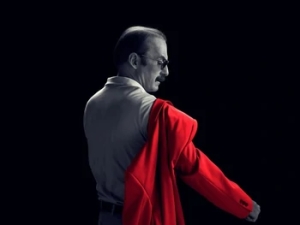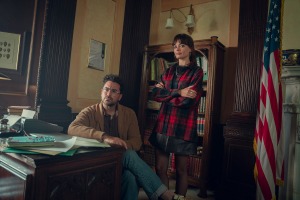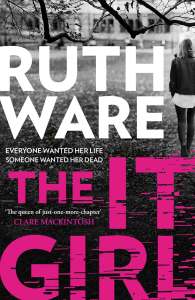 (Spoiler alert for entire series of Better Call Saul)
(Spoiler alert for entire series of Better Call Saul)
‘The obvious road is almost always the fool’s road. And beware the middle road, the road of moderation, common sense and careful planning.’
– William Burroughs
‘Seriously, when the going gets tough, you don’t want a criminal lawyer… You want a criminal lawyer.’
– Jesse Pinkman
Somewhere in Albuquerque, New Mexico, there is a marquee tent in a field after darkness. Crowds of people stream towards and around it, a certain kind of crowd that loves life after dark. The hustlers and ravers, bikers and goths, drug fiends and lost souls. Inside the tent itself there’s no circus, just a man in a sharp, colourful suit, an attorney who up until recently practiced under the name Jimmy McGill. After a year’s suspension he’s reinvented himself as ‘Saul Goodman’ and has erected his tent to give away drop phones and pitch his business to the night crowd. He establishes rapport with potential clients, brags about his legal victories, grossly exaggerates them – the scene is something out of a dark carnival on the edge of town: something wicked this way comes.
At the end of the night, his bodyguard Huell says: ‘Well done, magic man.’ Saul replies: ‘We’re just getting started.’
Breaking Bad was about the persistence of magic in the modern age. The villain of Stephen King’s The Stand is described as ‘the last magician of rational thought.’ That’s an apt phrase for Walter White as well. His story is a bitter one about pride and unused talent. Yet even though he’s a failed scientist and high school chemistry teacher, he can do things that seem impossible – build a car battery out of nothing, cut through reinforced locks, synthesise poison from coffee beans. He has an uncanny ability to turn the tables even from an impossible position. He is an accomplished manipulator, who can change others’ perception of reality. Magic is sometimes alluded to in the series. Jesse Pinkman entertains Andrea’s son Brock with magic tricks, and then tells him: ‘That’s science, yo’ – but to Brock it’s indistinguishable from magic. Skyler admits to Walt during a furious marital row that ‘I don’t have your magic’. The very state of Mexico, of course, is known as the ‘Land of Enchantment’.
While he can’t match Walter’s meticulous nature and scientific expertise, Saul does have one thing his client lacks: charm. Even his disapproving older brother Chuck must admit early on that ‘Jimmy has a way with people.’ And Jimmy is equal with his charm, everyone deserves a good impression from him, whether they’re a prisoner in courthouse lockup or an old lady on a coach in Amarillo (‘Edison – like the inventor?’ ‘Beautiful penmanship – a lost art!’) Chuck is suspicious of Jimmy’s charm in part because he could never replicate it and also because he knows that charm has a dark twin – persuasion.
Charles and Jimmy McGill have the legal profession in common but not much else. Charles is everything that Jimmy is not: disciplined, rule-bound, grave and meticulous and successful. Law has the same defining, shaping meaning in Chuck’s life as science did for Walter White: it is like the gas lantern that Chuck carries around his house, a guiding light in a dark world. The law is sacred – Jimmy just can’t be trusted with it. ‘I know what you were, what you are,’ he says. ‘People don’t change. You’re Slippin’ Jimmy. And Slippin’ Jimmy I can handle just fine. But Slippin’ Jimmy with a law degree is like a chimp with a machine gun. The law is sacred! If you abuse that power, people get hurt. This is not a game.’
Chuck must know there is plenty of scope for persuasion in the day to day practice of law. We have known for this for a while. In his History of Europe, Richard Evans writes about the development of law as a profession:
Not surprisingly, lawyers were constantly campaigning against unqualified hucksters, known in Germany as Winkeladvokaten, or street-corner advocates, and in Italy as faccendieri, fixers. In the 1880s the Naples hall of justice was said to be like a flea market, with would-be lawyers advertising their services at every corner.
It seems that the regulation of legal practitioners, from its very early days, was drawn up with people like Saul Goodman in mind.
The respectable world seems to share Chuck’s opinion. Betsy Kettleman says it explicitly: ‘You’re the kind of lawyer guilty people hire.’ Jimmy can make people laugh in the legal world, but he can’t make them respect or approve of him, to them he will always be ‘Chuck McGill’s loser brother’. In the final series he’s ostracised by courthouse staff completely, the DA puts the word out: Jimmy has crossed a line that turns him from semi-tolerated guest to pariah. The resentment obviously fuelled his transformation into Saul Goodman, and there’s a moment in Breaking Bad when he strong-arms a more established attorney into selling his client’s house for less than half its value: you can see on Saul’s face how much he enjoyed outsmarting the conservative, disdainful older advocate.
Persuasion is all about the game. Persuasion is what got Socrates killed. Persuasion is how Jimmy McGill got his start as a small time conman – persuading people to hand over money for items that turn out to be worthless or even nonexistent. Persuasion is about creative interpretation, twisting the rules, dancing up to the line without quite crossing it. And persuasion brings in another concept Jimmy is fond of: showmanship. Showmanship is the suits, the ring, the LAWYRUP car, the inflatable Lady Liberty, and all the accoutrements of the Saul Goodman identity that Jimmy accumulates on the way. These things are not glammers (although they are that too) they are marks of Saul’s talent. And talent, Stephen King says, wants to be used.
This is where Kim comes in. As an attorney she seems more built in the Chuck mode: diligent and professional and quietly outstanding. But she shares with Jimmy a love of persuasion and mischief, a streak of something wicked that becomes the basis of their brief, passionate love affair. When interviewed by a new firm she relates her early life growing up in a small town in Nebraska. ‘What do you want?’ asks the law partner. ‘More,’ says Kim. She wants something that’s commensurate with her talents and the conservative blue chip ABQ law world is never going to offer that. The passion Jimmy and Kim have in common is the passion to be their own person, to work for themselves, not for a firm, a bank, a corporation or a cartel. Like Boyd Crowder in Justified, they are outlaws rather than criminals. The important thing for Jimmy and Kim is never to give up their independence – and they have a cautionary tale in Howard Hamlin, their boss at HHM, a comical, derided and ultimately tragic figure.
The Game is not a hard thing to get into. During the first series – I mean, after Tuco’s calmed down – there is not much criminal activity at all. One episode begins with Jimmy sitting in a police station, there as Mike’s attorney, his back against a wall of fugitives. We pan down the wall of faces, knowing Jimmy’s likeness will one day be among them, and we linger on one: a guy called William Hill. Later, this same man rudely pushes past Jimmy to exit a cafe bathroom. The underworld is not obvious… but we always know it is there.
The practice of law intersects with The Game of the criminal world. There are very few morally uncompromised people in Better Call Saul, and those minor characters – Ernesto, Irene Landry, Manuel Varga. Even Chuck is not above the dark arts. He spent years quietly undermining Jimmy before actively trying to drive him out of the profession in series two (which, of course, makes Jimmy all the more determined to hold on to a legal career that he’d considered giving up in the past.) Chuck is as devious as Jimmy and as proud as Walter White: he won’t admit he is mentally ill because he can’t face any potential threat to his intellect, the brilliant mind that built his success in life and won him the respect he felt cheated of by his more loveable little brother. Even the thought that he might have made a transposition error in client documentation sends Chuck into a tailspin. At the heart of it is pride but also a kind of terrible tough love. Chuck is convinced that Jimmy will do great harm to himself and others, and of course he is right… but whether this is fate or just determinism is something for us at home to puzzle over.
The road to hell is a crooked one. A common criticism of Better Call Saul is that it was too slow moving. Jimmy McGill doesn’t make a clear conscious decision to get into The Game. There is no great fall but a crooked path with plenty of switchbacks, do-overs, false starts and dead ends – a slow, fascinating meander. Donna Bowman of the AV Club also identifies what makes the show more interesting and more tragic: the absence of innate evil in Jimmy’s world. While there was always a dark heart to Walter White, for his lawyer the internal soundtrack is less intense: freestyle jazz.
But there is also a sense that Jimmy was doomed from the moment he tried to scam the Kettlemans, which put him on the cartel radar – and also gave him a grounding in trauma and violence, enabling him to push through the horror as it escalates and therefore helping him survive the Game. Mike tells him:
We all make our choices. And those choices, they put us on a road. Sometimes those choices seem small, but they put you on the road. You think about getting off… but eventually, you’re back on it. And the road we’re on led us out to the desert, everything that happened there and straight back to where we are right now. And nothing – nothing – can be done about that.
Mike Ehrmantraut acts as a kind of Zen counsellor to Saul and others. As the above quote shows, he’s a fatalist, and a hard man, particularly on himself. Nothing fazes Mike – he meets even his own violent death with a deadpan equanimity: ‘Shut the fuck up, Walter, and let me die in peace’ (and Walter, incredibly, does.) After his son’s death, for which he blames himself, for Mike life is all epilogue. Hank told Mike that ‘your departure from the Philadelphia police was… dramatic.’ We now know just how dramatic that departure was. But revenge doesn’t seem to have satisfied Mike. He’s still haunted by guilt and loneliness, and he can’t tell the difference between justice and vengeance. So why do we love him? Because Mike makes us laugh, as a laconic foil to Jimmy, and because of his stubborn belief that there are rules and ethics to the Game, things you do and don’t do. Jimmy is heading into the darkness. Mike already lives there.
The road is not just for Saul and Mike. Albuquerque is full of criminal dilettantes – the Kettlemans, Dan the steroid nerd, Gale Boetticher, even Werner Ziegler the engineer – who think they can get into the Game without negative consequences for themselves. They all pale in comparison to Walter White, the ultimate criminal amateur, who upends the ABQ underworld entirely and leaves scorched earth. As Mike rants to Walter in Breaking Bad: ‘We had a good thing, you stupid son of a bitch!… We had everything we needed, and it all ran like clockwork…. It was perfect. But, no, you just had to blow it up.’
The story of Heisenberg was about bitterness and pride but also regret. Even in the last episode of Better Call Saul Walter is still going on about the company he formed in graduate school, convinced that his college friends scammed him out of billions. Walter wants a legacy but he also wants to live the life he believed was denied him (he keeps Jesse around because he sees the younger man as his missing third child, the son and heir Walt never had). Walt bares his soul – as much as he ever bares his soul – to Saul about this, only for the lawyer to tell his own most profound regret: injuring his knee doing a slip-and-fall. To this Walt just says: ‘So you were always like this.’
Yes, he was always like this: an ordinary guy from a small town with a taste for mischief. And this is the story, the story of an ordinary man who grew up in the small town of Cicero, a man with a good heart and a streak of something wicked to him: a man who could have done anything he put his mind to, but who ended up, after a string of criminal adventures, serving life in federal prison. And it is the story of his one, brief, true love, a brilliant young woman who was equal to him in both law and persuasion, a woman who could have done amazing things and still might.
Series creator Vince Gilligan has ruled out a return to Albuquerque, so it’s goodbye to that world as well – ‘quite a ride,’ as Saul says. It really was a land of enchantment, and an immense pleasure to spend time there.







